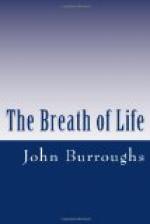There is something in the cells of the muscles that makes them contract, and in the cells of the heart that makes it beat; that something is not active in the other cells of the body. But it is a nonentity. The body is a machine and a laboratory combined, but that which cooerdinates them and makes them work together—what is that? Another nonentity. That which distinguishes a living machine from a dead machine, science has no name for, except molecular attraction and repulsion, and these are names merely; they are nonentities. Is there not molecular attraction and repulsion in a steam-engine also? And yet it is not alive. What has to supplement the mechanical and the chemical to make matter alive? We have no name for it but the vital, be it an entity or a nonentity. We have no name for a flash of lightning but electricity, be it an entity or a nonentity. We have no name for that which distinguishes a man from a brute, but mind, soul, be it an entity or a nonentity. We have no name for that which distinguishes the organic from the inorganic but vitality, be it an entity or a nonentity.
VII
Without metaphysics we can do nothing; without mental concepts, where are we? Natural selection is as much a metaphysical phrase as is consciousness, or the subjective and the objective. Natural selection is not an entity, it is a name for what we conceive of as a process. It is natural rejection as well. The vital principle is a metaphysical concept; so is instinct; so is reason; so is the soul; so is God.
Many of our concepts have been wrong. The concept of witches, of disease as the work of evil spirits, of famine and pestilence as the visitation of the wrath of God, and the like, were unfounded. Science sets us right about all such matters. It corrects our philosophy, but it cannot dispense with the philosophical attitude of mind. The philosophical must supplement the experimental.
In fact, in considering this question of life, it is about as difficult for the unscientific mind to get along without postulating a vital principle or force—which, Huxley says, is analogous to the idea of a principle of aquosity in water—as it is to walk upon the air, or to hang one’s coat upon a sunbeam. It seems as if something must breathe upon the dead matter, as at the first, to make it live. Yet if there is a distinct vital force it must be correlated with physical force, it must be related causally to the rest. The idea of a vital force as something new and distinct and injected into matter from without at a given time and place in the earth’s history, must undoubtedly be given up. Instead of escaping from mechanism, this notion surrenders one into the hands of mechanism, since to supplement or reinforce a principle with some other principle from without, is strictly a mechanical procedure. But the conception of vitality as potential in matter, or of the whole universe as permeated with spirit, which to me is the same thing, is a conception that takes life out of the categories of the fortuitous and the automatic.




